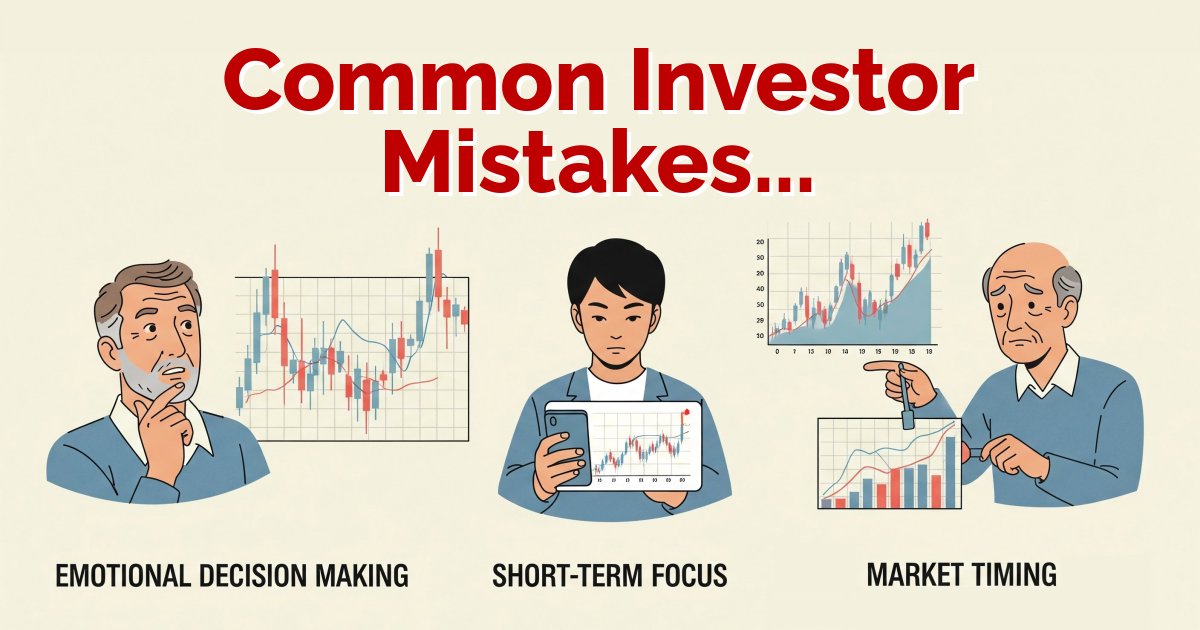Understanding Investments – Common Investor Mistakes
Wednesday 11 June, 2025
Independent Financial Adviser Howard Goodship reflects on 5 common investor mistakes
As I write this article, we have recently witnessed significant volatility in equity markets, caused primarily by “Trump Tariff Tantrums”. Equity markets fell by between 5% and 20%, depending on their geography and potential exposure to Trade Tariffs.
It was a scary time for the everyday saver with investments held in ISAs and pensions.
It caused me to reflect on the advice we offer our clients during such times when emotions and fear run high, and to detail some of the common mistakes I have seen made by investors over my almost 40 years of investing (I started work on the London Stock Exchange as a “Blue Button” runner on the trading floor in 1986).
Mistake 1: Investing money that is needed for the short-term (1-5 years) and keeping too low a level of cash
Investments can go down as well as up. It’s on all the literature and whilst you can select the level of risk (and therefore limit the volatility), investment values fluctuate daily. As we have recently seen and has occurred with regularity throughout history, this won’t change.
Therefore, it’s important to ensure you have sufficient cash available to avoid you needing to cash-in investments during a negative period.
Mistake 2: Continuing to draw income by selling investment units in a falling market
If you are drawing a regular fixed level of income from your investments, it works fine when investment values rise but during prolonged negative periods this can be very damaging. It’s called “sequence risk” and means you need to sell more units as the price per unit reduces to generate the same level of regular income. Then, when markets recover you hold less units so it’s much harder for your investments to recover.
Instead, you should be in a position to stop this income and spend cash, or use an annuity for short-term income needs (1-5 years).
Mistake 3: Believing the press and quoted experts
The press want to sensationalise news to grab attention and sell their story. They also tend to jump onto current trends. I can’t tell you the number of times they quote the latest fads which are topical and of interest to readers but ultimately can drive the wrong investment behavior.
Someone once told me to never take advice from a newspaper. It’s only costing you 50p so how good will that advice be?
Mistake 4: Allowing emotions to drive investment decisions
When investment markets fall it’s scary. When they fall for a prolonged period, it feels like they are in a black hole with no bottom, and it’s very scary!
However, the worst thing to do is capitulate – as the best years usually follow the worst years and you miss out on the recovery.
Likewise, when times are good, it’s human nature to want to earn higher returns and people can get greedy. Given this, I have often seen clients want to take more risk when prices are high (for fear of missing out) and less risk when prices have fallen and are low (because they are fearful).
Warren Buffet summarises the right behavior wonderfully “Be fearful when others are greedy and greedy when others are fearful”. Who’s going to argue with “The Sage of Omaha”.
Mistake 5: Trying to time the market
Not only do you need to get this right when you sell but you also need to get it right when you buy. Based on the fact that no-one can see the future, I would suggest this is impossible and more luck than anything else.
Instead, own high-quality investments for the long term and control the level of risk through the Asset Allocation.
Howard Goodship, Independent Financial Adviser in Ringwood concludes:
“I am sure there are plenty of other mistakes we can all make but these are, in my opinion, the most common. I hope this helps you to avoid them in the future and if you need professional financial advice, please don’t hesitate to contact us on 01425 208490 for a free initial, no obligation chat.”
Howard Goodship is an Independent Financial Adviser with Lonsdale Wealth Management, 5 Friday’s Court, Ringwood.
The value of an investment and the income from it could go down as well as up. The return at the end of the investment period is not guaranteed and you may get back less than you originally invested. The contents of this article are for information purposes only and do not constitute individual advice.
Latest News Next Article Previous Article



